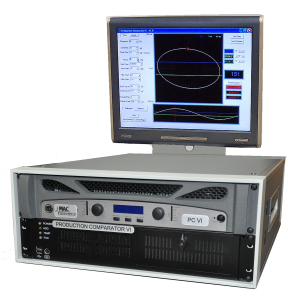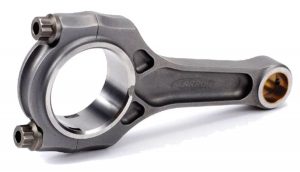PRODUCTION COMPARATOR VI
Detects Variations in Alloy, Heat Treatment or Case Depth
- Rapid sorting of ferromagnetic parts.
- Offers choice of Polar (Vector) or Lissajou screen displays.
- Inspect tubes or bars at production line speeds.
- Choose any one of 10 pre-set frequencies from 10 Hz to 150 Hz.
- Optional 8-channel multi-frequency software is available.
- System can be set up and monitored on site or via computer at a remote location.
- Monitor presentation provides simultaneous display of the “standard” piece and test piece waveforms for easy comparison.
- Test parameters, including filter, sensitivity, index gate and visible threshold levels, are selected using the keyboard or mouse while observing the effects on the display monitor.
- All functions and test setup parameters in software can also be accessed through a computer LAN network.
- Unlimited test setups can be stored on the hard drive for easy recall.

The Production Comparator VI is a Windows® based test instrument that uses low frequency electromagnetic techniques to inspect magnetic materials for variations in physical characteristics
Features:
- Analyzes signals from the fundamental frequency to its 13th order harmonic to provide a rapid NDT method for efficient sorting of ferromagnetic parts into groups.
- Built-in end suppression with adjustable In-and-Out time based delays, easy one click auto balance and built in self-diagnostics are also included.
- Two adjustable thresholds allow parts to be sorted into three quality levels.
- All setup parameters can be individually locked out to prevent unauthorized changes.
- New optional multi-frequency software allows simultaneous analysis of eight frequencies for a more complex test.
- To maximize the difference between pieces and minimize extraneous readings, the coil current can be adjusted, and one of three filter settings can be selected:
- All Pass filter – the selected fundamental frequency and its entire harmonics.
- Band Pass filter – only the selected fundamental, or only its harmonics.
- Notch Filter – everything except the selected fundamental frequency.
- Once the optimum settings have been selected and stored, they can be easily recalled for automatic operation.
COMPARATOR TECHNOLOGY IN NDT
A frequent challenge in manufacturing and industry is how to separate different parts that have been intentionally—or accidentally—mixed. Electromagnetic comparators can be used to accomplish this quickly and economically.
- This type of instrument “compares” variations in a test part to conditions in a known sample.
- When a metal part is placed inside or near a test coil that is excited by an alternating current, the voltage output from the coil will be affected. This is the basic principle employed by all electromagnetic comparators.
- The kinds of mixes that comparators will separate typically involve variations in alloy, heat treatment, hardness, structure, dimensions (including length) and certain other conditions.

